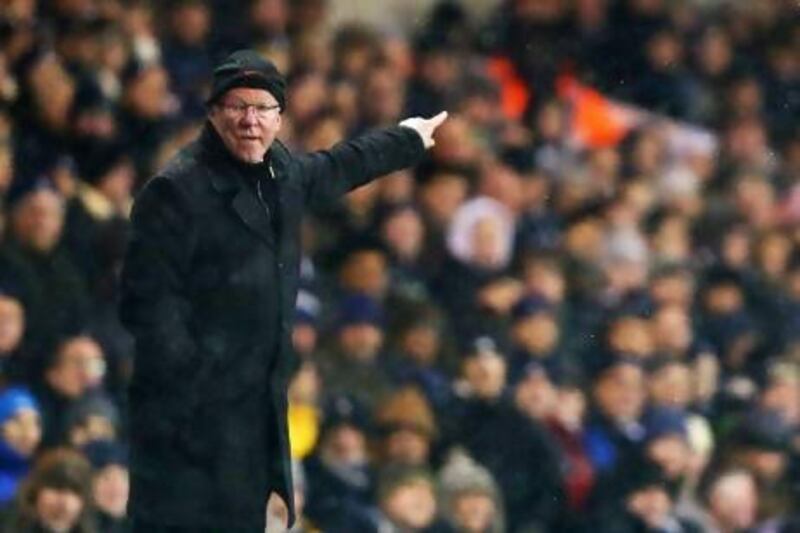Football, Tottenham Hotspur's record goalscorer Jimmy Greaves used to say with tedious regularity, is a funny old game.
Equally typically, Sir Alex Ferguson reacted with more anger than humour to the loss of two points at Spurs. The assistant referee Simon Beck joined the long list of scapegoats identified by the Manchester United manager.
Perhaps it was another example of Ferguson's age-old ability to deflect attention from the failings of his players; in the case David De Gea, whose inability to claim a late cross led to Clint Dempsey's injury-time equaliser.
And yet while it was the least Tottenham deserved, the funny - in the peculiar sense, rather than being laugh-out-loud amusing - thing was that one of the few times United have failed to win nevertheless produced one of their more laudable displays.
In adversity, theirs was a performance of mettle. Michael Carrick illustrated his powers of anticipation and ability to pass, Phil Jones and Danny Welbeck galloped furlong after furlong on the snowy turf and Rio Ferdinand, embarrassed by Tottenham in September, was defiant against them in the rematch.
Having said earlier in the week that United were no one-man team, Ferguson got proof, even as his outstanding individual, Robin van Persie, delivered yet another important goal.
Nor should the eventual result be dismissed. It leaves United having visited each of the three teams closest to them in the table and returned with seven points from a possible nine. It is a championship-winning return. It also brought memories of a previous 1-1 draw at White Hart Lane.
That, too, featured an added-time leveller, from Carlos Tevez five years ago, a goal that proved among the most crucial in a tight title race.
Yet if the main difference between 2008 and 2013 can appear that this time, unusually, United were the ones lamenting a late goal, a comparison between the two teams is instructive.
The boys of 2008 went on to become the Premier League and European champions. They also had a point fewer at this stage of the season than the current collective.
Yet were a combined 11 to be assembled, how many of Ferguson's modern-day charges would feature? Perhaps only two: Carrick, a finer player now than he was five years ago, and the magnificent Van Persie.
Elsewhere, Cristiano Ronaldo and Edwin van der Sar, neither properly replaced, are automatic choices. Tevez, terrific in 2007/08, edges out Wayne Rooney, whether the past or present version.
Ferdinand, Nemanja Vidic and Patrice Evra were all at or nearer their respective peaks five years ago; so, too, Ryan Giggs and Paul Scholes, neither of whom took the pitch on Sunday.
There are grounds to choose Rafael da Silva, an energetic and eager attacker, ahead of Wes Brown at right-back but the latter offered more defensive security in the finest campaign of his career.
That was a year where United only conceded 22 league goals in an entire season. Thirty have been sieved so far this time around. That United are in such a commanding position - Manchester City's first-team coach David Platt conceded the title is "theirs to lose" - is testament to the winning habit of accomplished escapologists.
The 24 points procured from losing positions offer a sign of an unyielding spirit.
In addition, they have a large and flexible squad and, unconventional as some of his selections can seem, Ferguson often identifies individuals who are suited to particular games. Welbeck is a case in point: his goals have dried up but his non-stop running has rendered him an effective, unselfish presence against Liverpool and Tottenham.
But statistical proof of the decline in defending is accompanied by more subjective assessments of a fall in standards such as the hybrid team from 2008 and 2013. Much as Ferguson has sprinkled superlatives after some undistinguished performances, United have become used to being damned with faint praise by outsiders.
They have only dropped 13 points all season. They also configure teams in attempts to halt opponents' strengths, whether Liverpool's passing or Tottenham's pace. To some, that is an admission of their own weaknesses. But they are mirrored elsewhere.
If the overall picture, whether with England's diminishing returns in the Champions League or Pep Guardiola's preference for the Bundesliga, Bayern Munich in particular, next season, points to a waning in the level of play in the Premier League, Ferguson's innate competitiveness means his most pressing concern is overcoming his immediate rivals.
It is something that, despite their lead in the division being trimmed to five points, United are doing. Indeed, they are threatening to manage it in record-breaking fashion. At their rate of progress, they are on course to end the season with 93 points, the most in the club's distinguished history. It would give the current side a claim to rank among the manager's greatest.
And yet a truer indication of their status comes by comparison: not with their principal opponents now, but with their garlanded predecessors.
Because, with the notable exception of Van Persie, how many of the current squad, at their recent level of play, would merit a place in the classes of 1994, 1999 and 2008?
Follow us
[ @SprtNationalUAE ]






